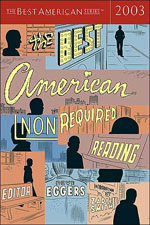…a transcribed discussion “Indian Red,” by Todd Schrenk, from theextrovert.net…
["Indian Red" is a personal narrative about Todd Schrenk's experiences at a protest in New Orleans, post-Hurricane Katrina. A grassroots group called the People's Hurricane Relief Fund and Oversight Coalition planned the protest to demand the "right of return" for all displaced residents. After reading this piece, we asked each other: How many people have protested something?]
Carmen [raising her hand]: I did. It made me feel better because I was like, “Look at all these people who agree with me.”
Iris: Did you skip school for it?
Carmen: Maybe, yeah. No comment. [Laughter] There is just this huge contingent of people who believe it’s worth it. But at the same time, is it really going to do anything? I hate to be cynical about it…
Katie: Sometimes protests are just glorified fights.
Arianna: I’m not sure they’re the most effective means of change, but what is the most effective means of change?
Sophia: I wrote an essay for school about how I thought it was an impractical way of [imposing change]. It doesn’t move you to their case to see a bunch of people sitting in a tree.
Arianna: Our generation is a little too cynical to protest on ideological terms.
[Some discussion about whether many protests become unfocused, with too many protesters bringing too many agendas to events]
Katie: Everyone has ADD.
Bora: I feel like “protest” has lost its meaning. “Protest” in its original and democratic form has really lost its meaning; now it’s “Grab some conga drums.”
Katie: Bongo drums?
Bora: Bongo drums.
[We begin to talk about how protesting can be successful...]
Terence: I think the smaller kinds [of protests] are relevant.
Bora: Those types of protest are effective because they’re not overly organized. Like the bus boycott for civil rights: do something so simple, and it’s effective. But now you need to have a band and concession stands…
Arianna: It’s indicative that people believe one person’s voice can’t say anything. It’s like you need to rent out an arena to say something. And get robot suits.
Bora: Like in Berkeley, there are naked women sitting in eucalyptus trees, which in the first place, must be incredibly uncomfortable.
[Here we discuss that in bringing attention to Darfur, protests keep the flame of an important issue alive. Through protesting, Americans have helped improve a terrible situation. We then wonder which Americans are more prone to contribute time/money. There is some discussion about how/why celebrities are often out in front on many issues.]
Bora: I’m comfortable with that, actually. It’s like Andrew Carnegie and the gospel of wealth.
Naomi: I think they should donate actually.
Arianna: [The problem is] pop culture covers celebrity events more than it would cover obscure philanthropic events like the recent Davos meeting, which is basically this conference where all the top world leaders, the commanding powers of international relations, get together and give speeches… And supposedly attempt to solve the world's problems. But we don’t hear much about it on the news, unless Angelina Jolie was there.
[By the end of the discussion, we all agree that it’s better to speak up because a citizen will never regret voicing one’s opinion.]
Subscribe to:
Post Comments (Atom)









No comments:
Post a Comment